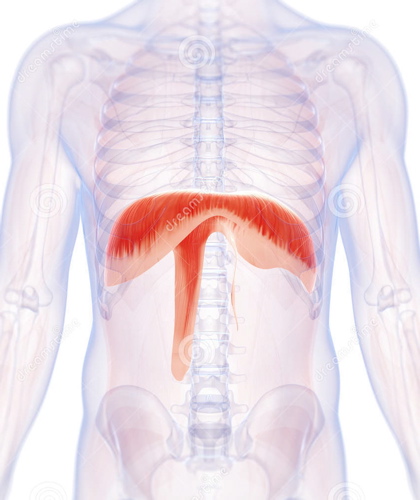Easier said than done, right? So why do necks stay so tight all the time?
When we work with patients who have chronic neck pain and shoulder tension, we usually find dysfunctional breathing patterns directly related to poor core body postures. Did you know the best muscle for getting air into your body is the respiratory diaphragm?  Without a well positioned respiratory diaphragm (you could also say a well positioned “core”) the neck muscles will try to help much more than they should with each breath in. So unless you choose not to breathe, (which I don’t recommend), necks in this scenario will stay tight all the time to help with breathing. Then, if you also add stress, lots of sitting, and poor ergonomics, neck pain can really get out of hand.
Without a well positioned respiratory diaphragm (you could also say a well positioned “core”) the neck muscles will try to help much more than they should with each breath in. So unless you choose not to breathe, (which I don’t recommend), necks in this scenario will stay tight all the time to help with breathing. Then, if you also add stress, lots of sitting, and poor ergonomics, neck pain can really get out of hand.
What to do?
To release a neck, we teach patients how to improve the effectiveness of their respiratory diaphragm by improving it’s position in the body. This can happen easily once the patient learns to find and feel their deep abdominal muscles during exhalation. Deep abdominal muscle shortening causes the diaphragm to “dome up” during exhalation. The bigger “dome” will then pull air down into the body more effectively during inhalation. With the primary breathing muscles now doing what they should, the neck muscle can take a well deserved break!
Now what?
Once patients get the hang of this new way of breathing, we have them “feel” the difference this makes in their ability to drop their shoulders and lengthen and “release” their neck naturally. Patients often have to learn how to let their necks relax again after long standing habits of overuse of the neck muscles.




